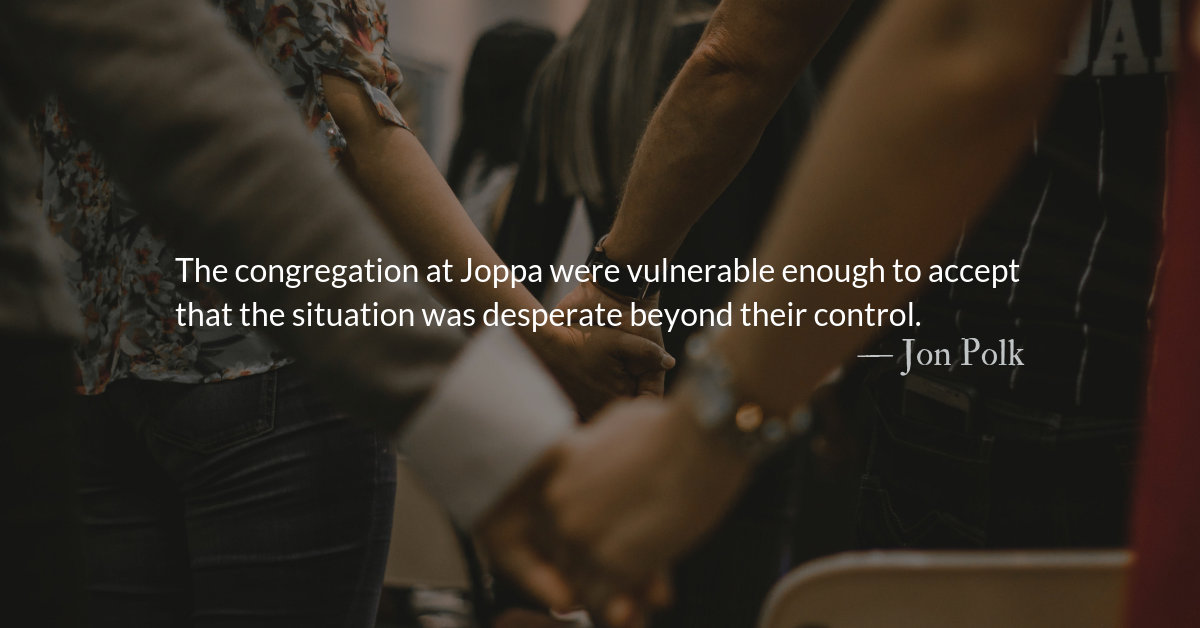Acts 9:40
Peter sent them all out of the room; then he got down on his knees and prayed. Turning toward the dead woman, he said, “Tabitha, get up.” She opened her eyes, and seeing Peter she sat up.
Reflection: A Congregation of Hope
By Jon Polk
Tabitha was a big deal in Joppa. A disciple and prominent member of the Joppa congregation, she was known for her generosity and considerable service to others, especially the widows in their midst. Apparently, her reputation carried outside the church to the larger Greek community as well, where she was known by her Greek name, Dorcas.
Tabitha’s great significance to the church is revealed after her untimely illness and death. Upon hearing that the miracle-working Peter was in nearby Lydda, not one but two witnesses were dispatched to urgently summon him. When Peter arrived on the scene, the group of weeping widows—who were not the usual professional mourners common of the day, but rather dear friends of Tabitha—showed him that the very clothes they were wearing were made by Tabitha, who distributed them to the poor and needy.
For the congregation in Joppa, Tabitha’s death was more than the loss of a close friend, it presented a serious impact on their ministry outreach to the poor. Without attempting to deal with the situation on their own, they reached out in tremendous faith for the power of God, represented by the healer, Peter.
In The Sacred Journey, author Frederick Buechner writes:
“When it comes to putting broken lives back together—when it comes, in religious terms, to the saving of souls—the human best tends to be at odds with the holy best. To do for yourself the best that you have it in you to do—to grit your teeth and clench your fists in order to survive the world at its harshest and worst—is, by that very act, to be unable to let something be done for you and in you that is more wonderful still.”
The congregation at Joppa recognized they had a God-sized need that required a God-sized solution. This congregation believed in a resurrection hope, in a God that could exceed all expectations. They came together to mourn and weep, but also to hope and pray, and eventually, to celebrate. They were vulnerable enough to accept that the situation was desperate beyond their control.
Life presents us with our share of challenges from daily nuisances to more significant needs for physical healing or spiritual resurrection. May we have the faith of the Joppa congregation and be willing to place our hope daily in our great God, the giver of life.
Prayer: The Greeting
Not to us, O Lord, not to us, but to your Name give glory; because of your love and because of your faithfulness. — Psalm 109.26
– From The Divine Hours: Prayers for Summertime by Phyllis Tickle.
Today’s Readings
Judges 5 (Listen – 4:36)
Acts 9 (Listen – 6:05)
Thank You!
Thank you to our donors who support our readers by making it possible to continue The Park Forum devotionals. This year, The Park Forum audiences opened 200,000 free, and ad-free, devotional content. Follow this link to join our donors with a one-time or a monthly gift.
Readers’ Choice Submissions
It is once again time for us to seek out the voices of our readers and hear from you about posts from the past eleven months that have challenged and comforted you and helped you find new meaning in the scriptures.
Readers’ Choice posts will be republished during the month of August and periodically throughout the Fall.
Follow the link to fill out the form. Feel free to fill out the form multiple times for multiple submissions. Please limit your submissions to posts published this calendar year, between September of 2018 and today.
For any questions about The Park Forum, or to make suggestions of posts via email, contact John Tillman at john@theparkforum.org
Read more from Jon Polk: Generosity that Outlives Tragedy
Many people are eager to donate towards an immediate one-time need, but are resistant to living an on-going lifestyle of generosity.
Read more about Good News to the Poor
When Mary sang about filling the hungry with good things, poverty and many other personal tragedies were considered markers of spiritual failure.






